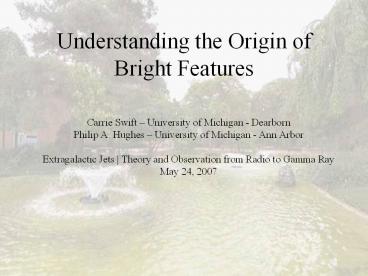Understanding the Origin of Bright Features - PowerPoint PPT Presentation
Title:
Understanding the Origin of Bright Features
Description:
Title: Imaging Simulated Relativistic Radio Jets Author: Becky Last modified by: Becky Wilczak Created Date: 5/15/2002 1:45:51 PM Document presentation format – PowerPoint PPT presentation
Number of Views:91
Avg rating:3.0/5.0
Title: Understanding the Origin of Bright Features
1
Understanding the Origin of Bright Features
- Carrie Swift University of Michigan - Dearborn
- Philip A. Hughes University of Michigan - Ann
Arbor - Extragalactic Jets Theory and Observation from
Radio to Gamma Ray - May 24, 2007
2
- Sophisticated simulations of relativistic flows
lead to large, complex data sets. - Typical data set 4-5 gigabytes per epoch of
physical data. - For time resolution similar to spatial resolution
would require on the order of a terabyte of data
to generate a simulated radio flux map. - We want to know where and when in the flows
history the bright radio features form. - How do we find the needle in this very large
haystack?
Alta Meadow Ranch - Montana
3
Methodology
- Perform a relativistic hydrodynamic simulation.
- Generate simulated radio flux maps.
- Select lines of sight corresponding to features
of interest and examine the physical conditions
that led to the formation of the radio features.
4
1. Perform a relativistic hydrodynamic simulation.
- Simulation CF7
- Fully Relativistic
- Three Dimensional
- Precessing inlet that leads to filamentary
structures over time. - v 0.9798c
- 6 epochs last run at time 2.502e03
- Resulting data set is 14 gigabytes
Philip Hughes
5
2. Generate simulated radio flux maps.
Angle of view 9º from direction of flow (within
1/?)
Static last epoch
Time-delay 6 epochs
- Emissivity Model Assume that the radiating
particles are the result of shock-Fermi
acceleration of the high energy tail of the
particle distribution. The acceleration takes
place in the region where the pressure is
highest, so using pressure to model emissivity
gives us a way to trace these particles.
6
3. Select lines of sight corresponding to
features of interest and examine the physical
conditions that led to the formation of the radio
feature.
7
8
Computational space of hydrodynamic simulation.
Rendered variable is momentum of flow
9
Computational space of hydrodynamic simulation.
Rendered variable is momentum of flow
Boundary between epochs
10
Computational space of hydrodynamic simulation.
Rendered variable is momentum of flow
Contours represent flux on plane of sky
11
Computational space of hydrodynamic simulation.
Rendered variable is momentum of flow
Line of sight 7760 Color corresponds to total
flux as function of retarded time
Contours represent flux on plane of sky
12
The flux of the line increases when it
encounters pressure enhancements due to
instabilities in the flow. Having an increase in
the boost in the region of the instabilities
results in a very bright line.
Flux range 0 to 1.2
Boost range 0 to 1.4 Pressure range 0 to 1.2
13
The Effect of Angle of View and Differential
Beaming on the Radio Morphology
Within 1/?
Outside of 1/?
Map 7005 no inlet 10755 lines
Map 7004 no inlet 3375 lines
14
Once outside the critical angle relativistic
effects no longer dominate the radio morphology.
Line 2537
Flux range 0 to 0.7
Boost range 0 to 1.2 Pressure range 0 to 1.0
15
- Conclusions
- This methods highly visual nature allows for a
straight forward analysis of radio features
arising from a complex flow, leading to a better
understanding of the relationship between the
physical flow and the radio morphology of
relativistic jets.
Anne-Marie Mineur
- Whats Next?
- Improved time resolution
- Apply to variety of simulations































